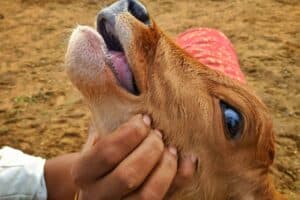South Africa’s meat supply is under pressure from a “triple whammy” of crises: bird flu in Brazil, a poultry producer’s collapse, and a foot-and-mouth disease outbreak.

A combination of a perfect storm of factors has led to a meat supply crisis which could see the price of meat spike over the winter, as well as increasing hunger and malnutrition, according to major players in the food industry.
The “triple whammy” which has hit the local market over the past few weeks is the ban on the imports of chicken from Brazil, some regions of that country having been hit by avian flu; a crisis at Daybreak Foods, one of South Africa’s largest integrated poultry producers, which has entered business rescue after being forced to cull 350 000 starving chicks and, finally, this week, the diagnosis of foot-and-mouth disease in animals on feedlots of Karan Beef.
A perfect storm
Eskort CEO Arnold Prinsloo said the three developments represented a perfect storm for food security.
He said that mechanically deboned meat from Brazilian chickens was used in affordable products such as polony and Viennas, adding that some smaller producers have already run out of raw material since the Brazilian import ban was imposed on 15 May.
“If the quarantine is prolonged or the disease spreads, it is possible that beef supply will contract and prices will rise, just as the supply of chickens from Daybreak comes under pressure from the company’s bankruptcy and polony vanishes from supermarket shelves,” he said.
“We have calculated that 400 million low-cost meals per month will be affected by the import crisis alone, so this triple whammy to food security requires urgent action from the department of agriculture, starting with a decision to narrow the Brazilian ban to Rio Grande do Sul, the only state affected by avian flu,” he added.
Poultry industry ‘disingenuous’
Prinsloo said he was disappointed by the poultry industry’s insistence that the import ban does not pose a food security risk.
“South Africa imports 19 000 tons of mechanically deboned meat every month from Brazil because domestic producers only have the capacity to supply 100 tons.”
He said it was disingenuous of the poultry industry to dismiss the looming shortage, particularly when the people who will suffer most are the ones with the fewest affordable choices.
Eskort has joined industry bodies including the Association of Meat Importers and Exporters and the South African Meat Processors Association in calling on Minister of Agriculture John Steenhuisen to instruct officials to expedite Brazil’s application for an agreement allowing it to apply for recognition of disease-free geographical zones.
Chicken supply cut
Another big bite out of the meat market supply was the cut of almost 12 million chickens a month following the National Council of SPCAs (NSPCA) suspension of Daybreak’s operations.
Last month, the NSPCA obtained an urgent interim court order from the High Court in Johannesburg compelling Daybreak Foods to immediately cease all inhumane culling practices and to provide adequate, appropriate feed to hundreds of thousands of breeder birds at its facilities.
The interim order was made final by the high court on 23 May. Farmers have called on the government to act to contain foot-and-mouth disease (FMD) before it is too late.
FMD spread in SA
Southern African Agri Initiative (SAAI) president Dr Theo de Jager said the outbreak of FMD in KwaZulu-Natal and its subsequent spread to some of the largest feedlots in South Africa, was a disaster of immeasurable scale for cattle farmers.
“SAAI has been engaging with the department of agriculture since December 2024, when the first rumours of FMD began circulating,” he said.
“It took months before the outbreak was officially declared and resources were mobilised to combat it.”
Karen Beef suspends exports
Meanwhile, Karan Beef spokesperson senior feedlot veterinarian Dr Dirk Verwoerd said a case of FMD had been confirmed at its feedlot facility in Heidelberg on Monday.
“The outbreak occurs during peak weaning season and will significantly disrupt the national supply chain. Farmers may be forced to hold calves longer than usual due to limited feedlot capacity. Karan Beef has suspended all exports,” he said.
Verwoerd said consumers should know there is no risk to human health and that local beef supply may be affected in the short term.
Business rescue for stricken chicken producer Daybreak Foods






